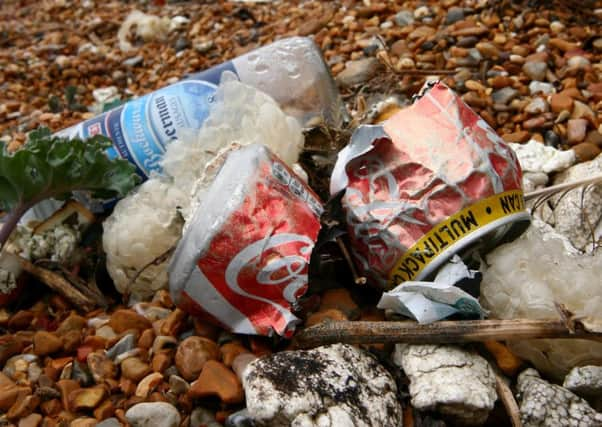Conservationists report more than 8000 plastic bottles found littering beaches


More than 8,000 plastic bottles were collected on beaches from Orkney to the Channel Islands, the report on the Marine Conservation Society’s 2015 Great British Beach Clean showed.
This averaged 160 bottles per mile or 99 bottles per kilometre cleaned.
Advertisement
Hide AdAdvertisement
Hide AdThe conservation group is calling for deposit return schemes on all single-use plastic and glass drinks bottles and drinks cans, which give money back to people who return their empty containers, to boost recycling and cut the amount of litter.
More than 6,000 volunteers headed to their local seaside for one weekend last September, collecting and recording litter along 340 beaches.
Overall, there was a 34% rise in rubbish at the seaside compared with 2014 levels.
All countries within the UK saw an increase - except Wales where levels dropped after a record rise the previous year.
Advertisement
Hide AdAdvertisement
Hide AdSmall pieces of plastic topped the list of litter picked up, with 960 bits collected for each kilometre of beach cleaned (0.6 miles).
Bits of glass were the second most common rubbish, with 208 pieces on average per kilometre of beach.
The volunteers found 197 crisp or sandwich packets and lolly or sweet wrappers for every kilometre of the seaside they combed.
Other common litter included bottle caps and lids, string and rope, cotton bud sticks, cutlery, trays and straws, as well as fishing nets and cigarette stubs.
Advertisement
Hide AdAdvertisement
Hide AdNumbers of plastic drinks bottles found in the beach clean were up 43% on 2014 levels while metal drinks cans were up 29% and lids and caps were up by 41%, the survey showed.
Lauren Eyles, MCS beachwatch manager, said: “The bottles we find on beaches are either dropped directly on to the beach, blown from land or sea, or end up their via rivers.
“The more we use as a nation, the more we’ll see ending up on our shores.”
The MCS said putting a charge on the bottles that gets refunded when they are returned would change behaviour, and called for the UK Government to explore the potential of such a scheme.
Advertisement
Hide AdAdvertisement
Hide AdIn Northern Ireland, litter levels in 2015 were up four-fold on the previous year, but with just seven beaches surveyed and cleaned, the MCS said they would like to see more volunteers getting involved next year to build up a clearer picture of the situation.
Scotland saw an increase of two thirds (66%) in levels of rubbish found on beaches around the country, with an average of 2,999 items picked up per kilometre across 75 stretches of seaside surveyed.
England saw record levels of litter across 189 beaches, with highest levels of rubbish - averaging 5,170 items per kilometre - in the South West
South East England has seen litter increase steadily, the North East is close behind, while the North West has the lowest levels of litter across England, but is still too high, the MCS said.
The Channel Islands had the lowest levels of litter for the UK, but rubbish still increased by a fifth (22%) compared with 2014.